- ROZTOČIL, Aleš and Pavel BARTOŠ. Modern Gynaecology. Prague: Grada, 2011. ISBN 978-80-247-2832-2
- solen.sk - Overview of the treatment of premenstrual syndrome and premenstrual dysphoric disorder. Solen. Igor Lazar, Alexander Ostró
- psychiatriepropraxi.cz - Premenstrual dysphoric disorder. Psychiatry for practice. MUDr. Vladimír Pidrman, Ph.D., MUDr. Klára Látalová
- healthline.com - PMS: Premenstrual Syndrome Symptoms, Treatments, and More. Healthline. Valencia Higuera and Crystal Raypole
How to manage mood changes during menstruation? 5 tips for psychological well-being
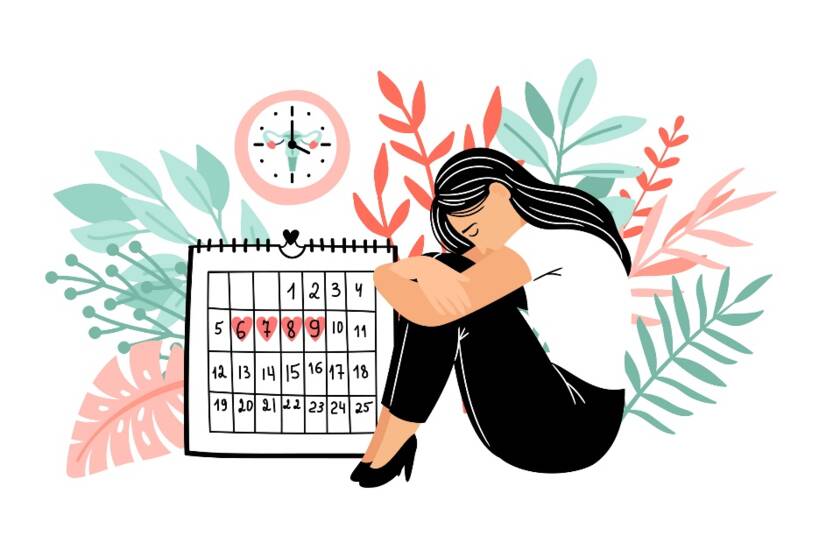
Premenstrual syndrome, known as PMS, can make women physically and mentally uncomfortable at the onset of menstruation. How does PMS affect the psyche and how can it be eliminated or treated?
Article content
A common psychological manifestation is moodiness, irritability and feelings of anxiety/depression. For causes, symptoms and tips on how to eliminate PMS and many other interesting information, see the article.
What is PMS?
Premenstrual syndrome is a set of clinical physical and psychological symptoms occurring before and at the onset of menstruation.
The etiology of PMS is not fully understood. The main factor is the change and decline in hormone levels before the arrival of menstrual bleeding.
Symptoms appear approximately 7 days before menstruation and disappear on the second day of menstruation. However, the presence, extent and intensity of symptoms are individual and vary from woman to woman.
However, some women may not experience any unwanted changes. Conversely, sometimes premenstrual syndrome can significantly affect even the most ordinary activities of daily life.
Causes of premenstrual syndrome
The menstrual cycle lasts approximately 28 days. It is characterised by cyclical changes in the levels of the hormones oestrogen, progesterone, FSH (follicle stimulating hormone) and LH (luteinising hormone).
The exact cause of PMS is not fully understood. Its underlying factor is a marked change and subsequent drop in sex hormone levels.
The drop in estrogen and rise in progesterone in the premenstrual phase of the cycle can cause adverse psychological changes and weaken the body's mental resilience. The onset of the premenstrual phase can also be marked by a decrease in physical energy.
The menstrual phase, in turn, is characterised by a marked drop in sex hormone levels.
In addition to cyclical fluctuations in sex hormones, there is also a drop in serotonin (a neurotransmitter in the brain), which is a key hormone for psychological well-being and good mood.
It is the insufficient amount of serotonin that can contribute to premenstrual anxiety, depression or melancholy.
Another factor influencing the course of PMS is a woman's lifestyle.
Lack of vitamins, minerals and protein in the diet, excessive consumption of salt and refined sugar, excessive consumption of caffeine, alcohol or smoking tobacco products can aggravate the onset and actual course of menstruation.
Conversely, it is advisable to increase mineral intake - magnesium, potassium and vitamins B, D and E - before the onset of menstruation.
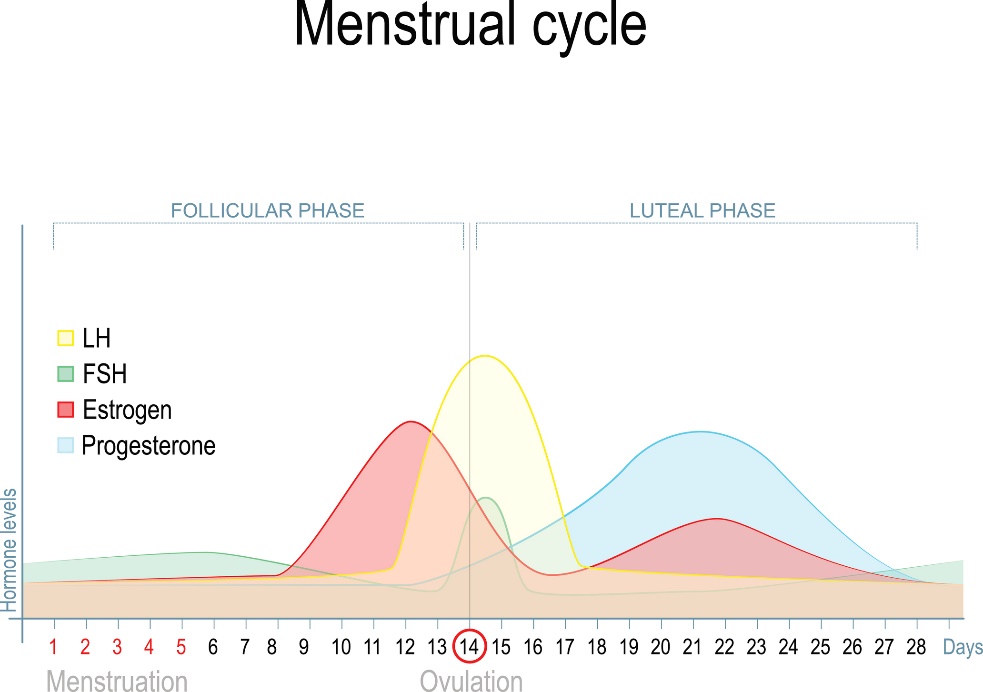
Psychological symptoms and manifestations of PMS
Emotional instability - moodiness, sudden mood changes and instability of the current psychological setting - is a common manifestation.
The most common mood is irritability and tearfulness.
However, this may not be a short-term condition. Anxiety or depression may accompany a woman for several days.
Symptoms of PMS are also impaired ability to concentrate, reduced concentration and perhaps mild confusion.
Premenstrual syndrome is accompanied by a decrease in physical and mental vitality. Feelings of exhaustion, excessive fatigue, general weakness or insomnia and a deterioration in sleep quality.
- Will only sleeping pills really help? The thorny road to undisturbed sleep
- Sleep hygiene: 10 simple rules for quality sleep
In connection with the decline in hormones and psychological state, a woman's sexual desire and libido can also decline.
Physical manifestations include lower abdominal pain and cramps, breast tenderness and pain, headaches/migraines, acne, nausea and digestive problems (diarrhea, increased appetite/nausea, bloating).
Mental and emotional symptoms of PMS:
- Moodiness and emotional instability
- Sudden mood changes
- Irritability and aggressiveness
- Anger and frustration
- Increased tearfulness
- Hypersensitivity
- Feeling of tension
- Sadness and anxiety
- Impaired concentration
- Decreased concentration
- Feeling confused
- Change/decrease in libido
- Feeling isolated from surroundings and society
- Difficulty falling asleep
- Poor sleep quality
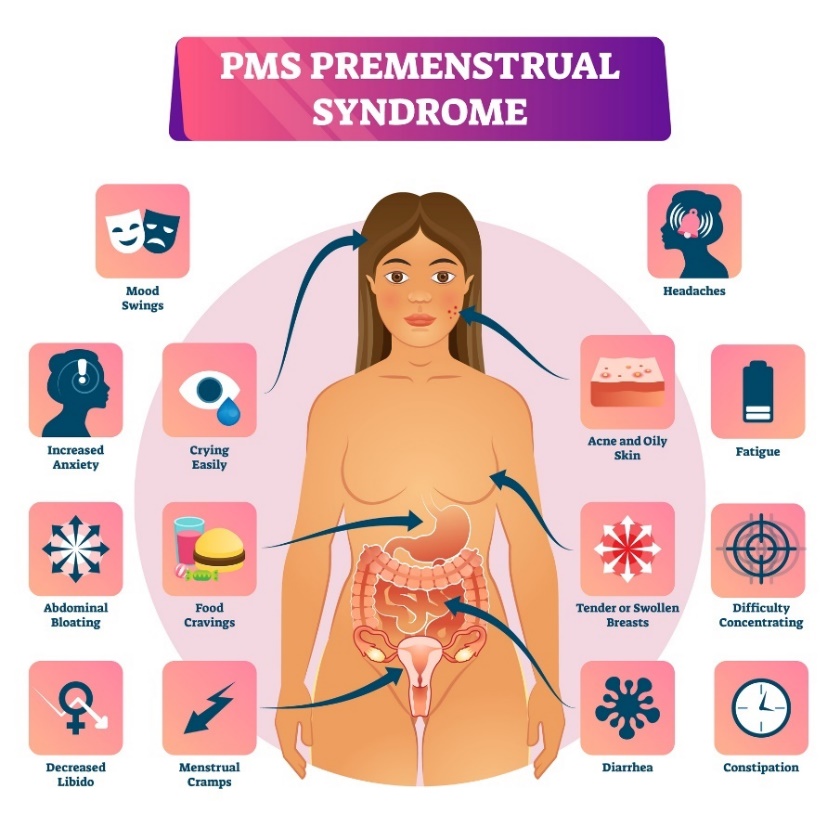
5 tips to manage the psychological symptoms of PMS
1. Natural herbs help
The help of nature should not be underestimated. Herbs that have a beneficial effect on the female genital organs and menstrual comfort are referred to as 'female herbs'.
Their application and consumption is possible in the form of:
- herbal teas
- tinctures
- extracts in food supplements
- external applications (inhalations, wraps, oils...)
Herbal tea is ideal to drink daily in the premenstrual phase and at the beginning of menstruation.
Its beneficial effects can alleviate the physical and psychological manifestations of PMS. They can eliminate soreness, indigestion, intensity of blood circulation and, last but not least, harmonize mood changes, manifestations of sadness and anxiety.
Examples of suitable herbs:
- Contryhel (cycle harmonization and menstrual comfort)
- Yarrow (to support cycle regularity and length)
- Yarrow (to promote relief from menstrual pain)
- Lemon balm (to promote psychological well-being and calm)
- Chamomile (to promote mental calm and reassurance)
- Peppermint (eliminating PMS symptoms and calming the mind)
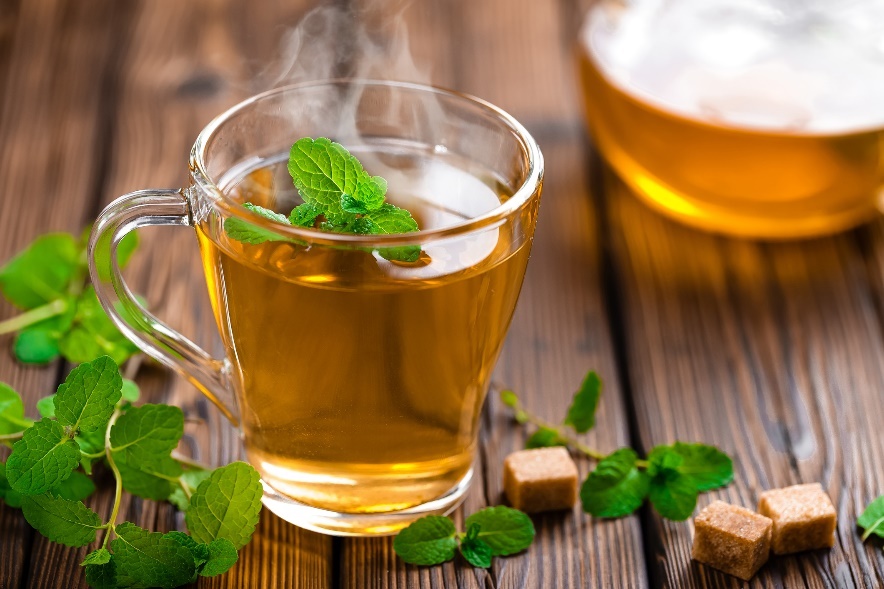
2. Aromatherapy
By inhaling herbs and various extracts, a woman can relieve the mental and physical symptoms of premenstrual syndrome.
Essential oils allow women to calm the body and mind. For PMS, it is advisable to use oils designed for the individual symptoms of this syndrome.
They can be used by applying directly to the skin, inhaling, steaming or virtually using an aroma diffuser indoors.
A representative of aromatherapy for menstrual physical and psychological comfort is sage and lavender oil. Sage oil helps with menstrual cramps and mood swings. Lavender oil has a calming effect and is analgesic.
Geranium oil helps relax the body, stimulates the lymphatic system and has a calming effect on the body and mind.
Examples of aromatherapy oils for PMS: lavender, sage, geranium, anise, peppermint, cypress, fennel and others.
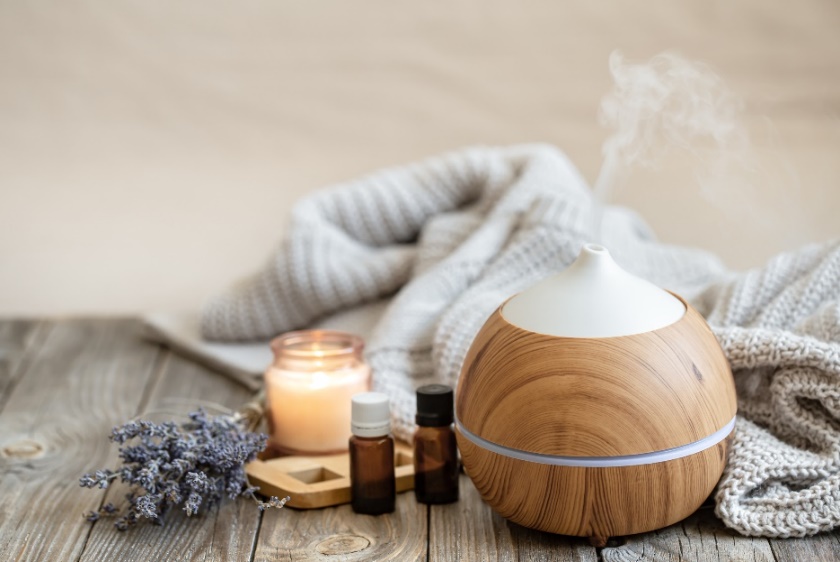
3. Breathing exercises for the diaphragm and relaxation
Light relaxation exercises will improve the function of the cardiovascular and lymphatic systems and have a positive effect on the psychological state.
If the physical condition permits more physical activity, it is advisable to apply walking in nature, cycling, yoga or pilates. Relief positions against cramps (cobra, wrap, pelvic rotation lying down...) are also suitable for painful menstruation.
During PMS, on the other hand, vigorous and impact exercises are not suitable.
A suitable exercise to calm the mind, oxygenate and relieve menstrual pain in the lower abdomen is the diaphragmatic breathing exercise.
This breathing exercise may seem simple at first glance, but it is not.
The starting position is lying on your back on a soft comfortable mat. The legs are bent at the knees and the feet are glued to the mat. The head is in imaginary direct extension of the spine and the shoulders lowered away from the ears.
There should be no space between the mat and the spine. The practitioner places the palms of his/her own hands on the sides of the last ribs - on the outside of the lower abdomen. The palms are primarily used to check the correct technique of this exercise.
For a better perception of one's own breathing, it is advisable to close the eyes.
With an inhalation into the diaphragm and abdomen, try to open the ribs sideways apart. Exert intra-abdominal pressure and stabilize the center of the body. Then with an exhalation, relax the abdominal wall and return to the original position.
Breathing is smooth and slow.
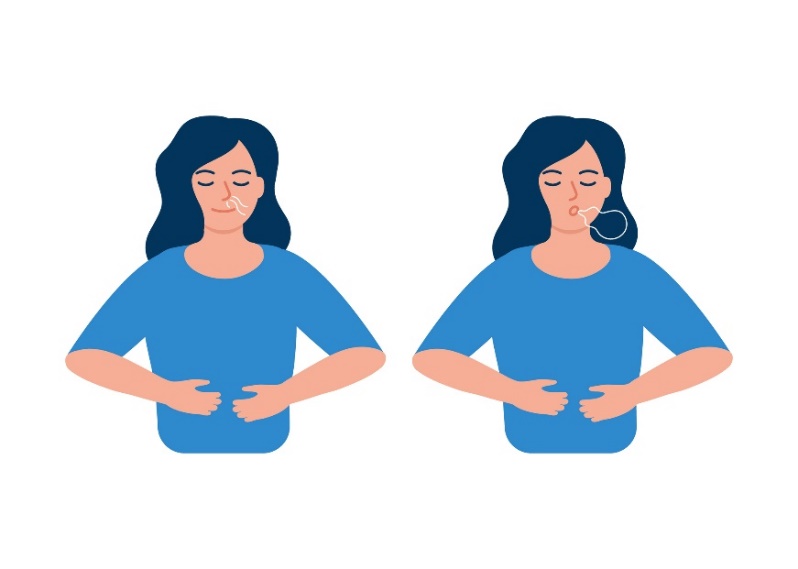
4. Gentle massage and application of heat
In the premenstrual phase and at the beginning of menstruation, there may be a reflexive muscle contraction. There is increased tension in the pelvis and lower spine. It is therefore advisable to relax the muscular and joint structures by gentle massage, self-massage or local application of heat.
Caution: Relaxation of the muscles, heat and blood circulation to the area may result in an increase in menstrual blood circulation.
However, if a woman suffers from excessive pain, severe cramps and psychological discomfort during PMS, it is advisable to relax the musculoskeletal system.
The ideal choice is a thermophore, which by local application of heat promotes blood circulation, lymphatic drainage, relaxation of muscle tension and consequently brings relief from pain.
The application of heat in the form of a thermophore, a warm compress or a warm shower is therefore suitable. However, bathing during menstruation is not recommended. It has a beneficial psychological effect.
An appropriate choice of massage is a gentle abdominal and lower abdominal massage to promote peristalsis. The massage should be particularly gentle, pleasant and painless. An aromatic back massage is also suitable as it causes a general relaxation of the body and mind.
5. Suitable diet for PMS
Although it may seem like a cliché to some, a wholesome balanced diet and a healthy lifestyle are essential for the proper functioning of the menstrual cycle.
Women who suffer from PMS should make sure they get enough vitamins (especially B, D, E) and minerals (especially magnesium, potassium, iron, calcium and zinc).
Any individual dietary intolerances/allergies should be observed. Drinking regime (pure water, mineral waters, herbal teas...) should not be underestimated.
Vitamins B1, B6, D and E support the immune system, regulate uterine prostaglandin levels (relieve menstrual pain), promote menstrual comfort and eliminate unwanted PMS symptoms.
Magnesium is a mineral that is beneficial for relieving cramps caused by muscle tension, relieves uterine muscle contractions and is beneficial for migraine.
In addition to dietary supplements, magnesium should be taken mainly in foods (avocados, broccoli, spinach, banana, seeds and nuts, beans, salmon, dark chocolate).
Adequate intake of iron should be ensured, as iron levels may be reduced during heavy menstruation.
Increasing the intake of the above vitamins and minerals in the premenstrual phase has a beneficial effect on the overall course of menstruation.
On the other hand, some foods should be avoided during the premenstrual phase as they may aggravate the symptoms of PMS. These are mainly refined sugar (sweets), caffeine, alcohol and dairy products and spicy foods.
It is recommended to avoid smoking tobacco products.
Last but not least, regular physical activity is advisable as part of a lifestyle to correct muscular imbalances in the pelvic area, compensate for work/school activity and thus promote mental well-being and mental well-being.
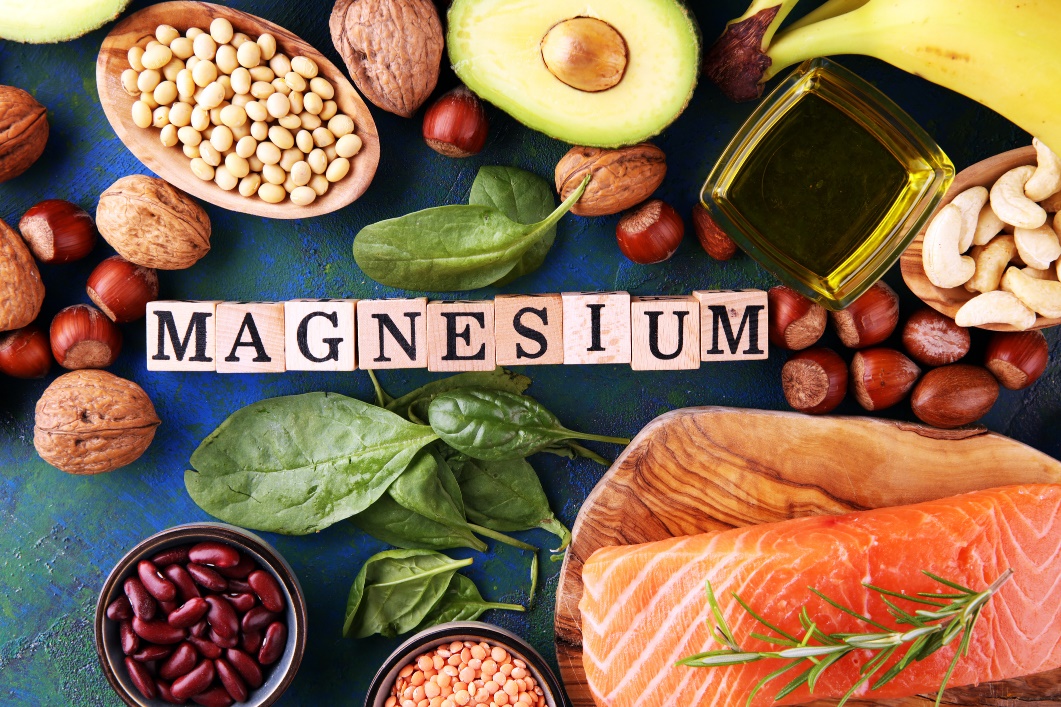
Interesting resources
Related










